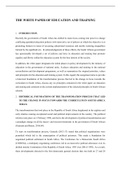THE WHITE PAPER OF EDUCATION AND TRAINING
1. INTRODUCTION
Recently the government of South Africa has shifted its main focus coming into power to change
conflicting apartheid education policies with innovative set of policies at which the objective is at
promoting fairness in terms of accessing educational resources and mostly restoring inequalities
formed by the apartheid era. In acknowledgement of these efforts, the South African government
has questionably developed a set of policies and laws in education and training that promote
equality and liberty within the education system for the best interest of the society.
In addition, the white paper designates the initial phases in policy development by the ministry of
education in the government of national unity. It places education and training in the national
reconciliation and development programme, as well as summarises the original priorities, values
and principles for the education and training system. In this regard, this assignment aims to provide
a historical foundation of the transformation process that led to the change in focus towards the
curriculum in South Africa, discuss any six principles contained in the white paper on education
and training and comment on the current implementation of the selected principles in South African
schools.
2. HISTORICAL FOUNDATIONS OF THE TRANSFOMATION PROCESS THAT LED
TO THE CHANGE IN FOCUS TOWARDS THE CURRICULUM IN SOUTH AFRICA
TODAY.
The transformations that took place in the Republic of South Africa heightened in the eighties and
early nineties causing exceptional social and political improvements in the country. The political
reforms took place on 2 February 1990, and led to the development of political transformation and
a paradigm change on all the macro- and microenvironments in the government of South African
(Gumede and Biyasi, 2016:69).
To start on transformation process, Gumede (2013:17) stated that political organisations were
permitted which led to the emancipation of political prisoners. This made a foundation for
negotiated political settlement in South Africa. The Conference for a Democratic South Africa
(CODESA), a multiparty negotiating conference, led in an innovative political allowance over its
drafted interim Constitution of the Republic of South Africa, 1993 (Act 200 of 1993). As a result,
these developments directed to the first democratic general election that was held on 27 and 28
, April 1994. These were the initial elections that ensured to include all citizens of South Africa
despite any form of unfairness. The elections included all the people in South Africa irrespective of
race, gender, and color. Furthermore, Gumede (2013:19) continues state that subsequently to the
election, the established changing government included the three levels of government, namely: the
national, the provincial and the local levels. The main accountability of any provisional state is to
conduct its political obligation of ruling properly in various aspects that affect the citizens. In
addition, these consist of socio-political, cultural, economic and educational concerns.
The new Constitution of the Republic of South Africa was broadcasted in 1996. In Chapter Two of
the Constitution of the Republic of South Africa (1996) the Bill of Rights was contained, whereby
the right to education was a fundamental right to all who are citizens of South Africa. The national
level of government, by its National Assembly, had the obligation of conscripting the national
policies. In addition, to the inclusion of the education policies, this must be successfully and
proficiently applied (Koma, 2010: 118).
The political deviations that were indicated in 1994 also made an important impact in the direction
of public administration, taking into account that public administration as a movement includes
policy implementation. Entirely, the apartheid policies were substituted by additional representative
and development-oriented policies. In respect of Education policies there were no exclusion, as they
were also affected by these political changes (Tleane, 2001:22).
The governing of the educational system, within the public management as a motion, has since been
directly affected by the political transformation process; and as result, it is not included in a vacuum.
Furthermore, the education system was also required to make severe modification, as it was very
disorganized and discriminative. The all-inclusive education curriculum demanded substantial
transformation. As a result, the implementation of the Constitution of the Republic of South Africa
(1996) set a basis for the new curriculum policy in South Africa. Mulenga (2018:35) defines
curriculum as a strategy for the procedure and development of teaching and learning, which
monitors the training needs- assessment phase intended for a precise learning programme.
The new curriculum policy is supported by the democratic principles of equality, social justice, the
advancement of a healthy environment and inclusivity. The effective implementation of such a
policy should have outcomes in the most required equal opportunity in education in South Africa,
irrespective of gender, race or religion. Consequently, this type of education that the people of South
Africa need would certainly be subject to the envisaged society that is defined by the Constitution
of the Republic of South Africa, which is the absolute edict of the country.as way of ensuring equal




